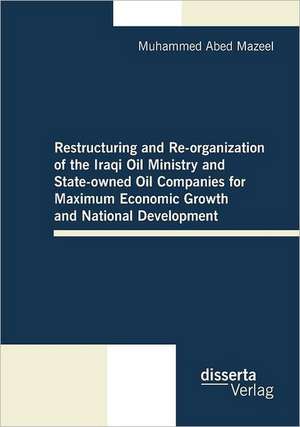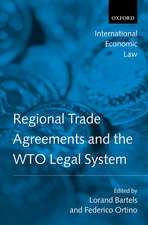Restructuring and Re-Organization of the Iraqi Oil Ministry and State-Owned Oil Companies for Maximum Economic Growth and National Development: Erhoffte Veranderung, Erfahrene Enttauschung, Gewaltsame Anpassung
Autor Muhammed Abed Mazeelen Limba Engleză Paperback – 31 mar 2012
Preț: 390.26 lei
Nou
Puncte Express: 585
Preț estimativ în valută:
74.70€ • 81.17$ • 62.79£
74.70€ • 81.17$ • 62.79£
Carte disponibilă
Livrare economică 31 martie-14 aprilie
Preluare comenzi: 021 569.72.76
Specificații
ISBN-13: 9783954250042
ISBN-10: 3954250047
Pagini: 98
Dimensiuni: 148 x 210 x 5 mm
Greutate: 0.13 kg
Editura: Disserta Verlag
ISBN-10: 3954250047
Pagini: 98
Dimensiuni: 148 x 210 x 5 mm
Greutate: 0.13 kg
Editura: Disserta Verlag
Notă biografică
Dr Muhammed Mazeel Al-Aboudi has worked for many years in the international sector of the oil and gas industry in several countries. He studied at the Faculty of Mining and Geology-Department of Petroleum engineering of the University of Belgrade (Diploma in Engineering), the Escuela Superior de Minas in Madrid, Spain (Credit in Applied Geophysics Engineering) and the University of Clausthal-Zellerfeld in Germany. He was awarded a PhD in Petroleum Engineering by the Technical University of Clausthal. He is working on another PhD in Petroleum Economics. After completing his PhD, he started working as Petroleum, Drilling, Production and Reservoir Engineer, focusing on issues like Fiscal Regimes, World Oil and Gas Field Developments, Investment, Cost Estimation, Energy Politics and Laws. Dr Mazeel has been employed in many European companies as a Senior Petroleum Engineer; He has also worked as Director General of the Iraqi Drilling Company (IDC) and Director General for the Oil Products Distribution Company (OPDC). At the same time, he was the oil industry adviser to the Iraqi Prime Minister Dr Ibrahim Al-Jaafari. He is the Author of many papers on petroleum engineering for the Society of Petroleum Engineers (SPE), the Canadian Institute of Mining, Metallurgy and Petroleum (CIM) and the German Oil-Gas Coal Magazine (EEZ). His next books, on Exploration Strategy of own-State Petroleum Companies, Formation Damage and Fundamentals of Gas Reservoir and Production Engineering are in editing and will be published soon.












